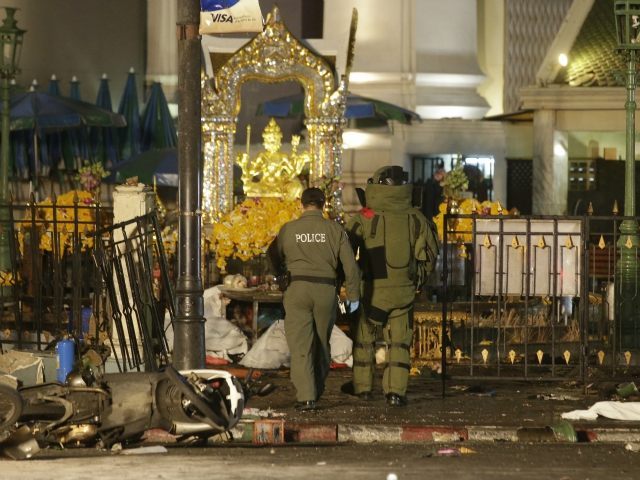The hunt for the perpetrators of the Erawan Shrine bombing in Bangkok continues, and the long-rumored Uighur connection seems to be firming up.
On Thursday, Thai police issued an arrest warrant for a Pakistani named Abdul Tawab, allegedly the head of a major human-smuggling operation, on explosives charges.
Zee News of India reports that Tawab was implicated by another suspect, Yusufu Mieraili, who was arrested on September 1 near the Thai-Cambodian border. Tawab’s wife, a Thai woman named Panissara Chaleerattarom, was arrested last Sunday.
Thai police seem intent on rolling up the human-smuggling gang Tawab has been linked to. Their customers were largely Uighurs, an oppressed Muslim minority from China, whose mass deportation from Thailand in July is often discussed as a possible reason for the Erawan bombing. Some speculate that the smugglers were enraged at how the Thai government’s enforcement of immigration policy was cutting into their business. A total of 13 arrest warrants have now been issued in Thailand, plus two suspects in custody.
The current theory seems to be that Tawab’s organization helped the bombers enter and escape from Thailand. “We think they are all on the same team. While we can’t identify the mastermind, we don’t think ‘Ishan’ (Abudusataer Abudureheman) is the man,” said police spokesman Prawut Tavornsiri, referring to a mysterious individual sometimes described as the key figure in the bomb plot.
“Tawab could be a facilitator while Panissara might have known about the illegal entry and given the perpetrators refuge,” speculated Tavornsiri, who said the police think “Ishan” was the fabled yellow-shirted man captured on security footage near the shrine shortly before the blast. He might have been the one who planted the bombs, but the authorities seem convinced he answered to someone else.
Tavornsiri’s remarks also suggested the Thai police might be relenting on their conviction that Ishan is hiding out in Turkey, an assertion the Turkish government has disputed. The police spokesman said his department would “coordinate more closely with Turkish authorities,” as well as the governments of India and the United Arab Emirates, to track the bombing suspect’s movements.
Voice of America News (VOA) notes that cracking the Uighur smuggling ring was the big break for Thai police, who had drawn criticism for handling the investigation poorly in the first few days after the blast.
“When they picked up a guy we now know to be a Turkish citizen of Uighur extraction in the apartment in Nong Chok they started to make that progress and once an arrest led to another arrest, obviously police work has accelerated and had made significant strides in the last two weeks,” said IHS Jane’s analyst Tony Davis, referring to the August 29 arrest in the Bangkok suburbs of a man with a stash of forged Turkish passports and explosives.
VOA notes the case has sensitive political dimensions, as the Thai government returned the Uighurs in July at the request of the Chinese government (which has recognized Thailand’s military coup), has seen relations with Turkey deteriorate over accusations that some of the suspects fled to Turkey, and is worried about damage to the vital Thai tourism industry due to fears of terrorism.

COMMENTS
Please let us know if you're having issues with commenting.